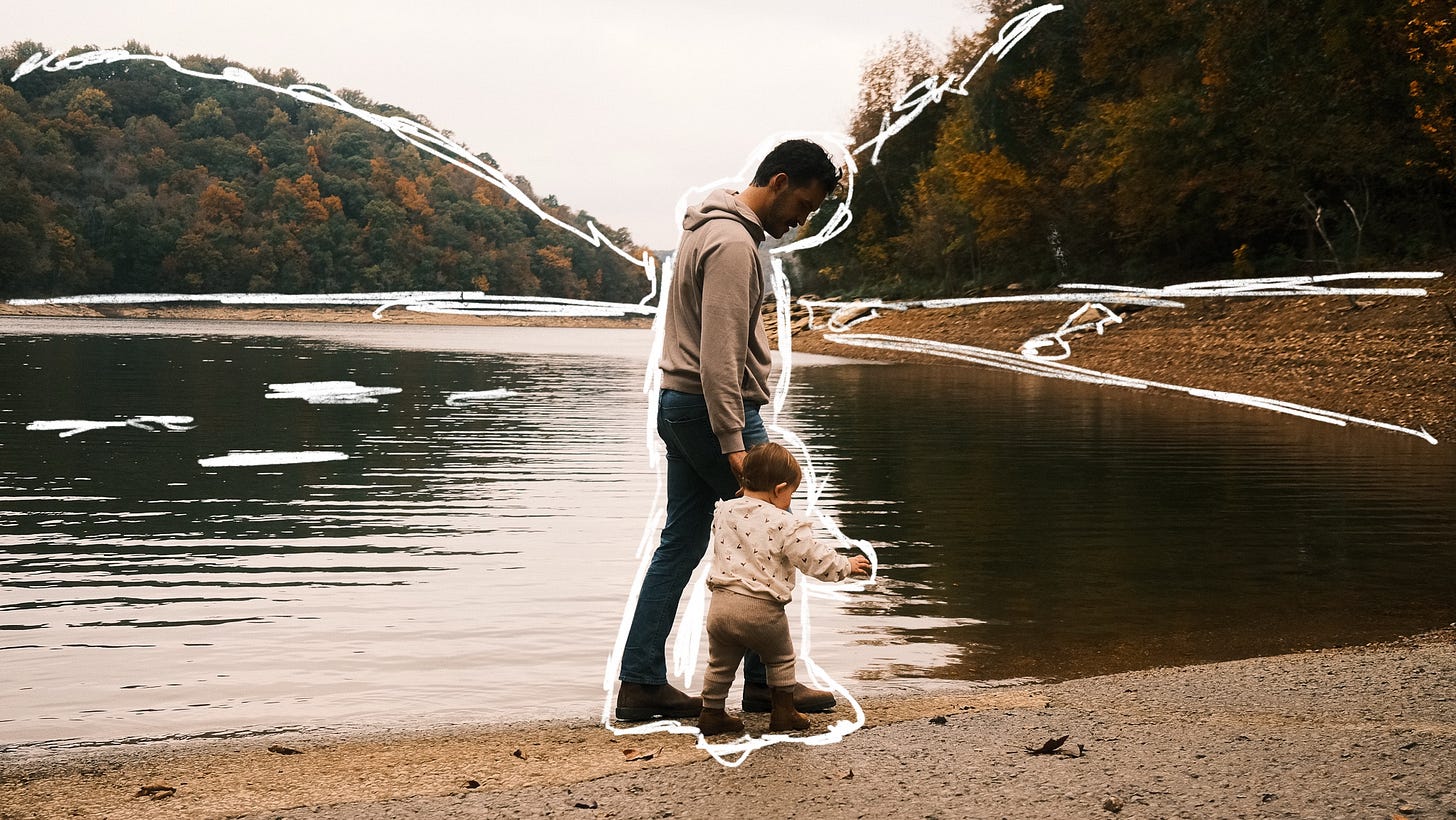A Therapist's Guide to Navigating Complex Relationships with Parents
From personal and professional experience.
I was asked by
to write an article about parental estrangement for her new Therapist Spotlight series in her publication. It was a labor of love, as this topic is close to both my personal story and clinical experience. I hope you experience the same reaction she did: "I teared up at the end because what you've offered is hope, peace, and understanding."This article may be helpful and practical whether you're navigating complex relationships with your own parents or know someone who is.
Let’s dig in.
I remember sitting in my therapist's office about eight years ago, grappling with something I needed to start facing but also wanted to avoid. As a licensed marriage and family therapist, I have spent thousands of hours helping others navigate their relationships, yet I often find myself confronting one of the most complex aspects of my own story: my relationship with my father.
For those of you who don't know me, I'm Blake Roberts, a psychotherapist who writes about healing attachment wounds, softening fear, and learning to trust yourself, God, and others again. Today, I want to talk about something that exists in a particularly gray area and has a lot of nuance to it: parental estrangement.
Pay attention to your body and your breath as you read this. If you notice yourself getting activated or short of breath, pause. Take some deep breaths or come back later if you need to.
The complexity of this topic cannot be overstated. As both a therapist and someone who navigates his own difficult relationships, I've learned that there is absolutely no one-size-fits-all solution. There’s a little boy in me who still wants a pure relationship and believes people can change. That little boy lives alongside the trained professional who understands the necessity of boundaries and the work it takes from both parties to move toward a healthy, secure relationship, especially after much harm has transpired. So, if you’re reading this, it’s likely because you have a complex relationship with a parent or parents.
This means there are many different stories that will influence everything that will be read from this point onward—details and context that you're aware of and I’m not, as well as details and context that neither of us are aware of (things that currently live in your subconscious mind). Some reading this may have a parent that was or is emotionally unavailable. Some may have experienced physical or sexual abuse at the hands of their parent. I might work a little differently with each of those clients in the room, in more nuanced ways than I can detail here.
Nonetheless, your story is valid, and your pain is your pain. There’s no need to compare yours to another's. Take what you want; leave the rest.
The Attachment Foundation
I’m trained as a Marriage and Family Therapist. That doesn't mean I work with couples and families; in fact, I mostly work with individuals. It does mean that I’m traditionally trained to look at how systems (both family systems and cultural systems) influence an individual. One way of doing this is by looking at things through an “attachment lens,” which is influenced by the study of Attachment Science—the field of study that explores the dynamics of the deep emotional bonds that develop between individuals, particularly between a child and their primary caregiver(s).
Originating from John Bowlby's attachment theory in the mid-20th century, it suggests that children come into the world with an inherent need to form attachments with others to survive. Mary Ainsworth, a colleague of Bowlby, expanded on his work with her "Strange Situation" study, identifying different attachment styles: secure, anxious-ambivalent, anxious-avoidant, and disorganized. You can go down a rabbit hole of your own research online, and you might be somewhat familiar with attachment science, but for now, that’s all the overview you need for this article.
It's important to understand why these relationships are so impactful. Our connections with our caregivers form the blueprint for how we learn to relate to ourselves, others, and the world. We learn how to understand love, trust, and safety in the world. We could get into the nature vs. nurture debate (which, I think, is both), but let’s focus on nurture for now. That’s why the decision to distance yourself from a parent feels like rewiring your entire nervous system—because, essentially, you are.
I’ve sat with clients who have experienced awful things at the hands of their caregivers and still have a desire for a relationship with them, even if it’s a fraction of a desire. This can be very confusing to one's system when there has been such harm. If that’s you, I want to acknowledge that war within. The parts of you that long for a better relationship and the parts that want nothing to do with them are both valid and both have a voice at the table. May you soften toward that war within, offer kindness to them, and receive compassion.
For Those Considering Estrangement
If you're contemplating creating distance from a parent, here are some questions to sit with. Note that these aren't meant to push you toward or away from any particular decision but rather to help you explore and clarify what’s happening within yourself:
What are you hoping to protect by creating distance? This isn’t about avoiding pain—but preserving something essential within yourself.
How can you notice the difference between your desire to avoid uncomfortable conversations and your need to protect yourself from genuine harm?
If you were to "just let it go," as people often aimlessly suggest, what would you be giving up? Often, the answer involves your trust in yourself—your agency.
Are you risking your identity and safety by maintaining the relationship in its current form?
Although therapeutic terms like “estrangement” and “toxic relationships” have lost their meaning and can be thrown around carelessly these days, people often avoid uncomfortable conversations and call it “setting boundaries.” However, most of the time, people don’t want to feel estranged from a parent. It’s not fun.
Each week get evidence-based insights from a licensed therapist on healing attachment wounds, softening fear, and learning to trust again. Move from self-protection to real connection—with yourself, others, and a God who is safe.
For Those Already Navigating Estrangement While Parenting
One of the most challenging aspects of parental estrangement is raising your own children while processing your relationship with your parents. The distance between my father and me really started to surface back in college. I’ve done a lot of work around that relationship, and we’ve had some difficult conversations over the years. But nothing has brought the pain from that relationship closer to the surface than parenting my own child. Often, it comes out of seemingly nowhere.
Here's what I often share with my clients who are in this position and remind myself of:
Trust your gut.
The very fact that you're thoughtful enough to worry about repeating patterns means you're already breaking them.
Your boundaries aren't just for you.
They're modeling healthy relationships for your children.
It's necessary to hold space for both grief and relief.
You can miss the relationship you wished you had while being clear about why the current reality isn't sustainable.
You don't have to have all the answers right now about how to explain the situation to your children.
Age-appropriate honesty that emphasizes safety and self-care is a healthy approach.
Continue “doing the work.”
Read books like Parenting from the Inside Out by Dan Siegel and others to better understand how your story influences your parenting.
Go to therapy. Talk with safe people.
Parenting can act as healing agents for the unprocessed parts of our stories. If we don’t continue to be aware of and process those stories, we will unknowingly re-enact similar relational dynamics in our current families and our children will feel responsible for our emotional immaturity…maybe you know what that feels like.
The Difference Between Boundaries and Estrangement
One important distinction is the difference between setting boundaries and choosing estrangement. Boundaries are limits we set while maintaining a relationship that are actually meant for the benefit of the relationship; estrangement is a more complete separation. Sometimes, the consistent inability or unwillingness to respect boundaries is what leads to estrangement—which is a grieving process if it becomes the path. This is something I would encourage folks to work on in therapy with a trained professional who can help you navigate the complexity of that path.
Why "Just Let It Go" Doesn't Work
This one really gets me fired up when I hear it offered as a prescription. Most people don’t enjoy sitting in the misery of what some people call “not being able to let it go.” Moreover, I’ve sat with clients who think they have successfully “let it go” only to realize what they actually did was dissociate from their experiences, thereby cutting off genuine desires and emotions, which then negatively influences their lives in the present. We don’t just “let it go.” We turn our backs to it only to discover we’re carrying a backpack that’s getting heavier and heavier.
I also find that most people are well-intended when they suggest similar messages. The reality, however, is that it’s actually not about you. It’s more about their inability to hold space for the complexity of your pain because they don’t hold space for their own. The more I heal, the wider my ability to care for others at their own pace becomes.
The truth is, if letting go were truly possible without addressing the underlying issues, you probably would have done it already.
Should You Keep the Door Open?
One question I frequently encounter—and think of myself—is whether to keep the door open for possible reconciliation. This is deeply personal, and there's no universal right answer. In my own journey, I've come to understand that the hope for change and the desire for connection can coexist with firm boundaries and self-protection.
That’s my current reality.
I have boundaries set in place, such as needing to go to therapy together with an unbiased, trained professional to help us navigate things in order to move toward reconciliation. At this point, I’m not giving up hope that people can significantly change and redemption can occur. I also firmly believe that it requires intentional work from both parties, not just words.
A Word of Encouragement
If you're struggling with this situation, know that I’m sad with you and that you’re not alone. I’m sad I have to write this article. I’m sad that relationships sometimes feel difficult and require so much energy. I’m sad that some people continue to choose self-protection and preservation over moving toward what is meaningful—even if it’s hard.
Whether you're considering estrangement, already navigating it, or trying to rebuild, please know that your story is valid. The complexity of your feelings, the seemingly contradictory desires for both connection and protection, the grief and the relief—it’s all normal and worthy of attention and care.
If you’re reading this and engaging with the depths of your own pain, you’re breaking generational patterns and creating a healthier example for your kids. Trust yourself to know what you need, even as those needs evolve. Take this article a step further: grab a journal and answer some of the questions above. Write about what surfaced as you read this. Talk with a friend about it.
Also:
Go on a walk with someone you love.
Drink water.
Get good sleep.
Pray.
Meditate.
Watch something that makes you laugh.
Create some art.
Invest in community.
Tell your kids something specific you love about them—and do that again.
Let your safe people in.
And, finally, if this article resonates with you, I invite you to share your thoughts or experiences in the comments below. Your story matters, and in sharing it, you might help others feel seen—feel less alone—in their own journey.
With Care,
Blake
Popular Posts:
There's an Epidemic Among Men
I work with men, women, and teenage boys, although the majority of my practice is comprised of men in their late 20s to late 40s, most of whom are married with families or dating. While the epidemic I want to address today is certainly not discriminatory—it affects us all—I want to focus on how it specifically pertains to men.
20 Things I've Learned as a Therapist
The path to becoming a therapist for me is quite interesting. After graduating college, where I played football and earned a degree in religion thinking I’d become a pastor, I found my way to managing an art gallery and creative brand.





Blake, all I can say for now is thank you. I’ll be processing this for a bit. 🥹
🙏❤️ - thank you Blake for your kind and wise words and for your loving energy on this topic. This is my spin on one of your thoughts that resonated deeply with me - there is a little boy in me who still wants a pure relationship and believes people can change. That little boy lives alongside the adult who understands the complexity of this topic, is aware of and acknowledges the little boy and little girl that live alongside his adult parents, accepts the necessity of boundaries and self protection, and embraces self preservation and care.
I have been more or less told to let go by family and friends; that my story isn’t valid, or dismissing my story.
I would love to hear more from you on your thoughts on how to engage with siblings on this topic. I have three and none share my story. One likely would consider the relationship pure. Birth order, gender, personality etc all seem to play into how siblings hold different perceptions of their parents and their upbringings.